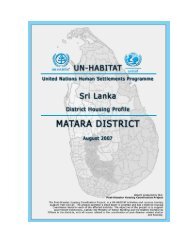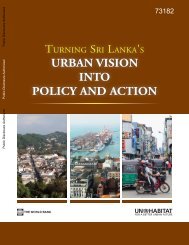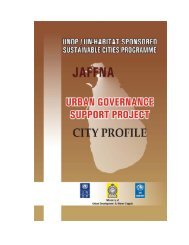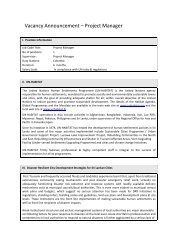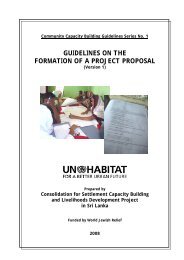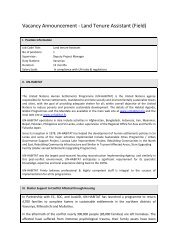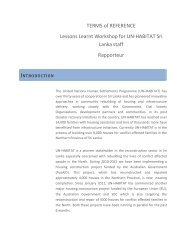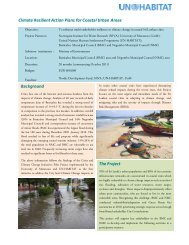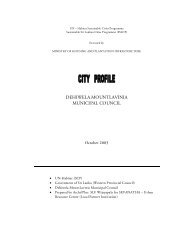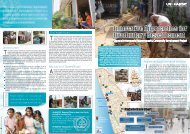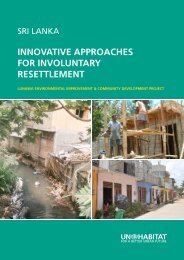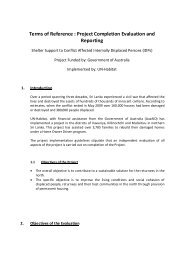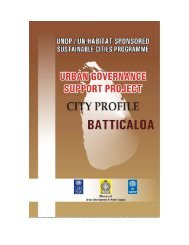Conference Proceedings : âJANASEVANAâ National ... - UN HABITAT
Conference Proceedings : âJANASEVANAâ National ... - UN HABITAT
Conference Proceedings : âJANASEVANAâ National ... - UN HABITAT
Create successful ePaper yourself
Turn your PDF publications into a flip-book with our unique Google optimized e-Paper software.
Janasevena Programme Strategy: Mr. Anura Dasanayake, Director of the Lunawa Environment Improvement and<br />
Community Development Project commented that it is necessary to consider several critical issues in the housing<br />
sector with regard to land, finance, and regulatory frameworks within the context of the one million housing<br />
programme. Therefore, it is imperative that the Ministry obtains support from other organisations. He also mentioned<br />
that there is a need to develop a hand book on “Technical knowledge and institutional arrangements”. The Additional<br />
Secretary, Ministry of Housing and Construction responding to Mr. Dasanayake said that many issues have been<br />
solved through coordination committees under the Janasevana Programme which includes a Cabinet Sub Committee<br />
appointed by the President.<br />
The Women’s Cooperative Bank, queried whether the Janasevana programme could include Micro Finance Institutions<br />
as they are already implementing a housing loan programme and hence could assist with the provision of housing<br />
loans. The Janasevana programme had already included Community Development Societies. However the inclusion of<br />
Micro Finance Institutions was unclear following the presentation at the Symposium. In response, Mr. Withana<br />
expressed willingness to collaborate with the Women’s Cooperative Bank in implementing the Janasevana<br />
programme.<br />
On the question of coordination, it was mentioned that there is significant coordination taking place amongst agencies<br />
and organisations at present, on the reconstruction of the Northern Province. The necessity for a flexible, efficient<br />
coordination role in housing construction was emphasised.<br />
The Chair recommended that housing and settlement policies should be integrated with other relevant <strong>National</strong><br />
Policies. The <strong>National</strong> Planning Department should consider all these factors including the issue of water quality in<br />
proposed metro areas prior to developing settlements. Disaster resilience should be considered in land use planning.<br />
It was recommended that the NHDA guidelines on disaster prevention should be widely shared at the Provincial level.<br />
Day 2: 23 March 2011: <strong>National</strong> Housing Symposium<br />
TECHNICAL SESSION 3: A HOME WITHIN REACH: AFFORDABILITY AND QUALITY OF HOUSING<br />
In Sri Lanka, the housing sector contributes to the national economy in various forms. It contributes to the<br />
construction industry at large and generates both skilled and unskilled employment. Housing credit is an important<br />
factor for the growth of the housing sector and access to housing finance has always been limited to a traditional<br />
approach. The domestic capital market has not been effectively explored to facilitate the housing sector, and in<br />
particular the formal banking sector had been more conservative and inflexible. This symposium provided a platform<br />
to discuss and share experiences and lessons learned in innovative financing products which could enhance the<br />
financial inflow for the housing sector.<br />
The session Chair Mr. Don Barnabas stated that the housing credit sector is a vital area for Sri Lanka. Currently the<br />
country is at a critical stage in terms of growth, following the 30 year civil war, which came to an end in 2009. He<br />
expressed his appreciation to the organisers of the symposium for providing a platform to discuss these important<br />
national issues.<br />
According to the 2001 survey, there are 4.7 Mn housing units in Sri Lanka. The Central Bank Annual Report of 2003<br />
indicates a shortage of 400,000 housing units. This figure is expected to rise to 650,000 by 2010. The Indian Ocean<br />
Tsunami of 2004 had destroyed 65,000 units while 44,000 units were partially damaged. There is also a major need for<br />
housing in the North & East of Sri Lanka following the 30 year civil war between the Government of Sri Lanka and the<br />
<strong>Conference</strong> <strong>Proceedings</strong> – <strong>National</strong> Housing Symposium 18



